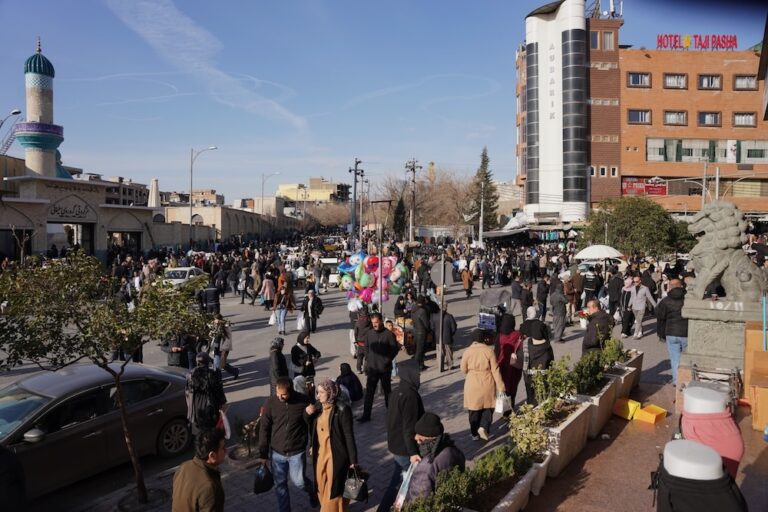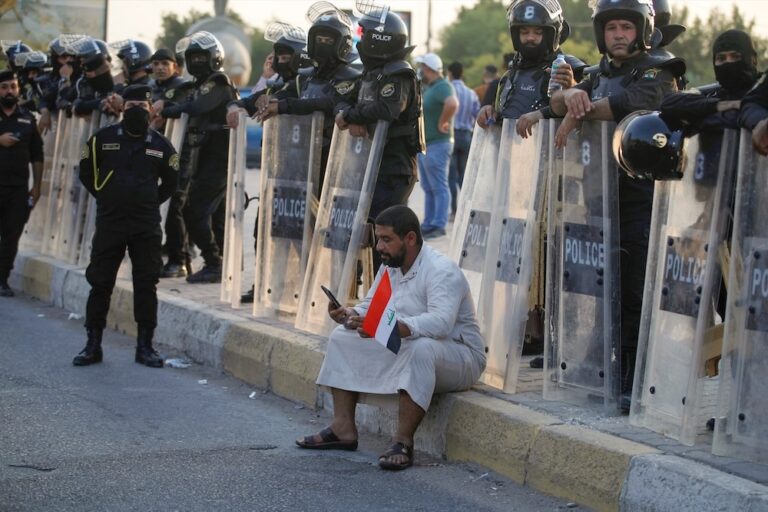In recent weeks, journalists have been arrested, assaulted by authorities, and been the target of terrorist attacks by armed groups.
(RSF/IFEX) – 12 April 2012 – In the light of the Information Technology Crimes law before the Iraqi parliament, and the proliferation of attacks on journalists in recent weeks, Reporters Without Borders is extremely concerned about freedom of information in Iraq.
Repressive bill
Reporters without Borders is worried about the cyber crime bill, on which the Iraq parliament is due to vote shortly. The law, approved at a first reading last July, represents a real threat to freedom to report the news online. The crimes it covers are far too broadly defined and the penalties are disproportionate.
These include violations of religious, moral, family or social principles and the promotion of terrorist ideas. The bill provides for custodial sentences up to life imprisonment for using computers and the Internet to undermine state security or national unity, or for publishing information on trafficking in drugs or people (article 5).
The draft does not provide appropriate protection for news organizations and their sources. Technical providers are held responsible for content channeled through them and the guarantees protecting users’ personal details are too weak.
Read an open letter to the Iraqi authorities by ARTICLE 19 and Access Now signed by over 40 NGOs and expressing concern about the repercussions of the law on basic freedoms and free speech.
Threatening statement
The interior ministry published a statement on 12 April aimed at all media organizations working in Iraq, domestic as well as foreign, urging them always to identify their sources inside the ministry and threatening prosecution if they refused to reveal them.
As has been previously reported, Iraqi law guarantees journalists the right to maintain the confidentiality of their sources and they can be forced to reveal them only in certain individual cases and by a court decision.
The independent member of parliament, Safia Al-Suhail, said two days ago these demands by the ministry were “contrary to the spirit of the Iraqi constitution and the new democratic order”. She urged parliament to change the law to protect journalists’ rights from the “arbitrary practices” of the executive.
(. . .)
Salim Mohamed Al-Khalifawi, a reporter with the Saudi news agency SPA, was arrested by riot police on 30 March in Dhi Qar province south of Baghdad at a demonstration by followers of the Shi’ite religious leader, Mahmoud Al-Hassani Al-Sarkhi.
The police beat him with sticks, seized his video camera and ordered him to leave the area. Al-Khalifawi, however, showed his press card and his name tag was clearly visible to the officers.
As he was leaving the area after the incident, he was again stopped and questioned by members of the security forces. His press card and details were checked. He was then taken the police headquarters to have his identity recorded. His Iraqi journalists’ union card was confiscated.
The police took him to an unidentified location where he was held for three days. He appeared before the Nasariyah appeal court on 1 April and was subsequently freed on bond.
Bashar Mandalawi, a freelance journalist, and Marc Nexon, a French reporter for the magazine Le Point, were held at a checkpoint and questioned for several hours by Iraqi troops on 5 April. They were working on an article and interview south-west of Baghdad. An intelligence officer accompanied them to their meeting place and was present during the interview with their contact.
On the same day, the journalist Saad al-Awsi wrote an open letter to Prime Minister Nouri al-Maliki asking him to halt the persecution to which he had reportedly been subjected by the premier’s supporters, in particular inside the intelligence services.
Al-Awsi spent 16 months in detention, between April 2010 and August 2011, over an article criticizing the means by which al-Maliki achieved power.
On 6 April, riot police tried to prevent a crew from the Al-Sumaria TV station from covering a demonstration in Baghdad. The police forcibly seized the crew’s camera. It was returned after the station’s management complained to the authorities, in exchange for a promise not to shoot any film.
(. . .)


